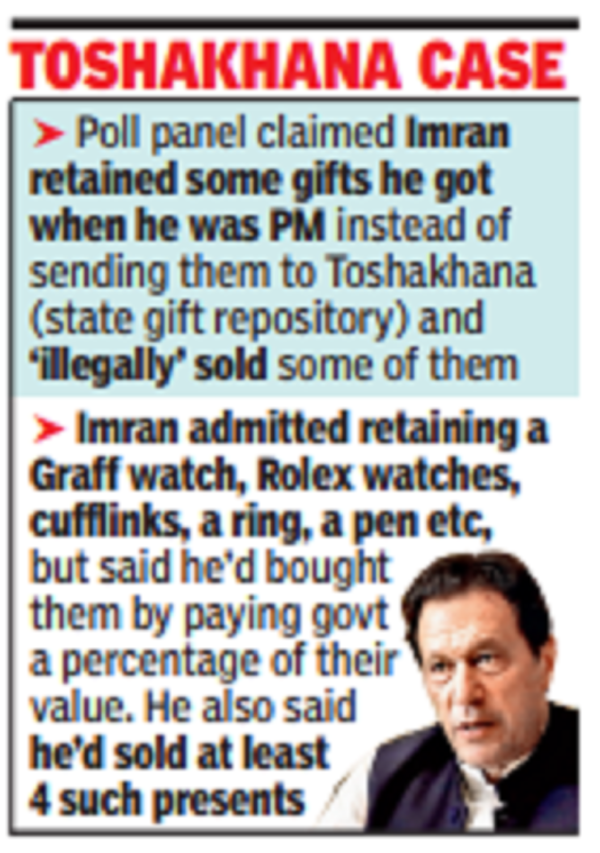The conviction technically disqualifies the Pakistan Tehreek-i-Insaf chief from electoral politics for five years.
The verdict came just a day after the Islamabad high court declared the trial court’s maintainability verdict in theToshakhana (state gift repository) case “void” and ordered the district and sessions court to decide the matter again after re-hearing the matter. The Toshakhana case, filed by ruling party lawmakers, is based on a criminal complaint filed in a trial court by the Election Commission of Pakistan (ECP).
The ECP complaint alleges that Imran, during his time as PM, had “deliberately concealed” details of the gifts he retained from the Toshakhana.
Following his arrest, the former cricketer-turned-politician was transferred to Islamabad amid tight security.

District and sessions judge Humayun Dilawar sentenced Imran — who was absent from court — to three years’ imprisonment and fined him Pakistani Rs 1 lakh. His lawyers, too, were not present.
As the guilty verdict was about to be pronounced, Imran’s lawyer Khawaja Haris appeared before Judge Dilawar and informed him that his legal team was barred from entering the court premises. “We want to file for a transfer of this case from your court,” he said. The judge paid no heed and announced the verdict.
“The court finds it is more than convincing that the complainant (ECP) had provided confidence-inspiring, well-knitted and corroborated evidence, and so the charge against the accused (Imran) has successfully been proven that the accused has committed the offence of corrupt practices by making and publishing false statements/declarations in respect of assets acquired by way of gifts from the Toshakhana and disposed of during the years 2018-2019 and 2019-2020,” the trial court judge said in a short order.
Judge Dilawar said that Imran provided an “incorrect declaration” in his statement of assets and liabilities submitted to the ECP for the year 2020-2021. “He has been found guilty of corrupt practices by hiding the benefits he accrued from the national exchequer wilfully and intentionally. He cheated while providing information of gifts he obtained from the Toshakhana which later proved to be false and inaccurate,” the order read.
“His dishonesty has been established beyond doubt,” it added. The judgment said the PTI chief was convicted under Section 174 (offence of corrupt practices) of the Election Act and sentenced to three years in prison.
The judge also directed that a copy of the order, along with the arrest warrant, should be sent to the Islamabad police chief for execution. The arrest warrant authorised the Islamabad police chief to arrest Imran and send him to Central Prison Adiala, Rawalpindi, to “serve out his sentence”.
In a pre-recorded message released by his party after his arrest, Imran said: “By the time this message reaches you, I will be in jail.”
“In the wake of my arrest,” the PTI chief said, “I want you to continue peaceful protests and not to sit quietly inside your houses.”
“My movement is not for myself, but for you, for the future of your children,” he stressed, recalling that Pakistan, too, was founded on the concept of freedom.
“If you will not stand up for your rights, you will live a life that is of slaves, and slaves have no life. Slaves are similar to how ants are — on the ground — they do not fly high. This is a battle for your rights and freedom … you have to continue peaceful protests until you get your rights, which is seeing a government elected by you and not a ‘qabza (usurper)’ mafia,” Imran added.
Police surrounded Khan’s Zaman Park residence in Lahore on Saturday even before the verdict was released. He was taken into custody soon, without any major resistance, as the court ordered his arrest. There was also no immediate sign of unrest in the hours following his arrest, unlike last May when his arrest in a separate graft case sparked political turmoil and deadly clashes between his supporters and the police. PTI supporters had at that time also damaged several military and state installations, including the corps commander’s residence (Jinnah House) in Lahore and the gates of the military’s General Headquarters in Rawalpindi.
In Khan’s absence, according to PTI officials, former foreign minister Shah Mehmood Qureshi, who is also PTI vice-chairman, will lead the party. Following Khan’s arrest, and after an emergency PTI core committee meeting, the party said it discussed its future plan of action and legal measures to secure Imran’s release.
The party called for peaceful protests across the country within the ambit of the law and the constitution and also appealed to the Supreme Court to hear its review petition, filed earlier in the day, against the maintainability of the Toshakhana case.
The PTI said it had started acting on Imran’s instructions for its organisation and political plan of action, adding that the entire nation had rejected the sessions court’s verdict.
Footage aired on TV stations and social media forums showed PTI supporters, including lawyers, protesting against Imran’s arrest outside his Zaman Park residence in Lahore. Protesters also came out in Khyber Pakhtunkhwa’s Bannu city in the northwest with party flags.
In some parts of KP district administrations have imposed a ban on the gathering of more than four people to prevent a law and order situation. Authorities also barred “provocative social media posts” that may incite the public to break the law and because they may “contain disparaging remarks against state institutions”. The official notification added the directives would remain in place from August 5 to September 5.
#Imran #Pakistan #exPM #Imran #Khan #sentenced #years #jail

Leave a Reply